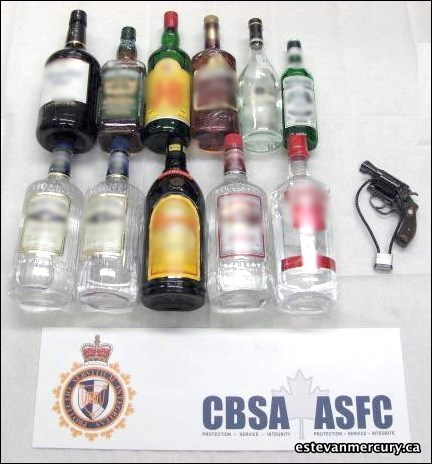It was a busy November at the Canadian border ports, according to information released by Canadian Border Services Agency, with much of the activity surrounding attempts being made by travellers to avoid tax payments through false declarations or undervaluing goods being brought into this country.
On Nov. 3, CBSA officers examined an Alberta resident's truck and cargo trailer and found a small volume of hash, drug paraphernalia and two prohibited weapons (switchblade and replica firearm). The contraband and truck were seized and the man was given a $1,400 penalty. Once the penalty was paid the truck was returned, but the weapons were confiscated.
Four Michigan residents made their way to the North Portal station on Nov. 4 and their motorhome was referred for examination. The four said they were coming to Canada to hunt waterfowl. When officers examined the home, they found 10 concealed bottles of alcohol and a prohibited .38 calibre handgun. The motorhome was seized as was the alcohol and firearm. The motorhome was returned following the payment of a $1,000 penalty.
On that same day at the Torquay area port, a man who was living and working in North Dakota on temporary conditions was denied entry when he sought to visit Canada for the day. He was denied entry when the CBSA officers ran a background check that indicated the man had served 20 years in prison for cocaine smuggling and had recent outstanding drug charges levied against him.
A stun gun was seized by CBSA officers on Nov. 18. The gun was taken from a truck that came from Oklahoma that was delivering goods into Canada. The driver was penalized $500 and the weapon was seized.
On Nov. 19, CBSA officers seized several undeclared weapons from two Alaska residents. They seized 16 high capacity rifle ammunition magazines, a switchblade, hand-held crossbow and two blowguns. The pair was refused entry and paid a $500 penalty before they were able to retrieve the truck and trailer they had been using.
On Nov. 24, a Colorado man working in North Dakota was denied entry due to a criminal background. Officers discovered the man had an extensive criminal record including 10 impaired driving convictions.
On Nov. 26, a Saskatchewan man returning from a North Dakota lounge raised suspicion among the CBSA officers who were running a routine check. They administered a roadside screening test which he failed so he was arrested and turned over to members of the Estevan RCMP detachment.
On Nov. 28, a U.S. resident attempted to enter Canada to work but was denied entry when officers uncovered a serious criminal history that included gang membership and assault with a deadly weapon conviction. The assault had apparently caused grievous injury to the victim.
There were several instances in November of travellers having to pay penalties for undeclared goods, penalties that could have been avoided had they decided not to take the risk of smuggling in the undeclared or undervalued items.
"Your future border crossings could be more closely scrutinized and you may jeopardize your membership in trusted traveller programs," said White.
On Nov. 11, a Saskatchewan traveller importing an antique car from Minnesota declared the car at a value of $8,000 but it was determined that its value was actually $13,800. By trying to save $295 in GST, the importer ended up paying a penalty of $3,250.61.
Two days later, another Saskatchewan resident undervalued a pickup truck purchased in Texas by $7,133. The penalty for that was $3,923 rather than the $365 he was attempting to save in GST.
On Nov. 22 at the Estevan Highway port, a Saskatchewan resident failed to report a commercial importation of clothing valued at $791.40. The importer was therefore penalized $2,000 in accordance with the Administrative Monetary Penalty System that is in effect for such cases.
A Saskatchewan resident returning home on Nov. 23 noted he was importing a car from Texas which he said was worth $18,000, but he had actually paid $25,000 for the vehicle.He was penalized $3,923 for his efforts at trying to save $356 in GST payment.
On the last day of November, a trucker from Saskatchewan failed to declare five cartons of cigarettes purchased in the United States. He was given a $200 penalty and the cigarettes were seized.
CBSA officials remind Christmas season travellers it is best not to wrap any gifts purchased outside Canada since the officers may have to open packages to verify the actual items.
After an absence of 24 hours, travellers may bring back $50 worth of goods duty and tax-free. After 48 hours, the personal exemption is $400, and after an absence of seven days, you are entitled to bring back $750 worth of duty and tax-free goods. There are no personal exemptions for same-day purchases.
Any questions regarding taxes, duties and declaration of goods may be directed to CBSA by contacting them through their toll-free phone 1-800-461-9999.




